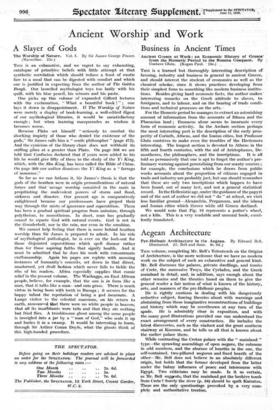Ancient Worship and Work
A Slayer of Gods
By Sir James George Frazer. The Worship of Nature. Vol. I. (Macmillan. 25s.)
THIS is an exhiiustiv-e, and- we regret to say exhausting, catalogue- of primitive beliefs with little attempt at that synthetic correkitioix which should reduce a feast of exotic fare to a meal that can be digested with comfort and which one is justified in expecting from the author of The Golden Bough. Our laurelled mythologist toys too lazily with his quill, with his blue pencil, his scissors and his paste.
One picks up this volume of expanded Gifford lectures with the exclamation, "What a beautiful book!"; one lays it down in disappointment. If The Worship of Nature were merely a display of book-learning, a well-edited" digest of our mythological libraries, it -would be unsatisfactory enough ; but when learning masquerades as wisdom it becomes worse.
Because . Plato -set himself seriously to °combat the shocking impiety of those who denied the existence 'of the gods," Sir James calls him a " senile philosopher" (page 475). And the cynicism of the- library chair does not withhold its sniffing gibes at a greater than Plato. On page 368 we are told that Confucius declared that if years were added to his
life he would give fifty of them to the study of the King, which, with the Shu King, has been called the Bible of China. On page 369 our author dismisses the Yi King as a "farrago of nonsense."
So far as we can fathom it, Sir James's thesis is that the gods of the heathen were in origin personifications of natural forces and that -savage worship consisted- in the main in propitiating the- malevolent powers of storm and flood, sickness and disaster. Our present age, is comparatively enlightened because our predecessors have groped their way through the mists of ignorance and superstition. There has been a gradual spiritual progress from animism, through polytheism, to monotheism. In short, man has gradually ceased to equate God with natural events. God is not in the thunderbolt, nor in the rain, nor even in- the sunshine.
We cannot help feeling that there is more behind heathen worship than Sir James is prepared to admit. In his rfile of mythological pathologist, he is ever on the look-out for those disjointed superstitions which spell disease rather than for those aspiring faiths that signify health. And it must be admitted that he does his work with consummate craftsmanship. Again his pages are replete with amusing instances of humanity's conceits, set down in that direct, unadorned, yet droll fashion which never fails to tickle the ribs of his readers. Africa especially supplies that comic relief in the present volume. The Wachagga, an East African people, believe, for example, that the sun is in form like a man, that it talks like a man--and eats grass. There is much virtue in being born with teeth in Busoga ; it secures for the happy infant the reputation of being a ggod incarnate. A Lango visitor to the celestial mansions, on his return to earth, announee4 that there were no white people in heaven, that all its innabitants wore tails and that they ate nothing but fried flies. A troublesome ghost among the same people is inveigled into a jar by a "man of God," who seals it up and buries it in a swamp. It would be interesting to learn, through Sir Arthur Conan Doyle,- what -the ghosts think of this high-handed procedure.






















































 Previous page
Previous page